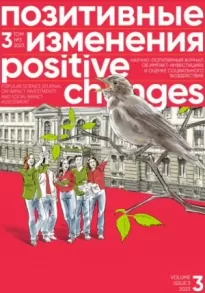Позитивные изменения. Том 3, № 3 (2023). Positive changes. Volume 3, Issue 3 (2023)

- Автор: Редакция журнала «Позитивные изменения»
- Жанр: Научная литература / Газеты и журналы
- Дата выхода: 2023
Читать книгу "Позитивные изменения. Том 3, № 3 (2023). Positive changes. Volume 3, Issue 3 (2023)"
TRACING THE ROOTS AND GLOBAL PERSPECTIVES ON THE PARTNERSHIP
In the late 1990s, American academic Prof. Gregory Dees recognized the potential of social entrepreneurship (SE) both as a profession and as an academic discipline. In 1995, he presented the world’s first course on social entrepreneurship at Harvard University. This pioneering move signaled a growing trend. While only ten American universities offered courses in social entrepreneurship in 2002, by 2008, this figure ballooned to over a hundred institutions across 35 countries.[69]
Since then, the number of such disciplines in foreign universities has only increased, and, as the authors of the “Universities and Social Entrepreneurship”[70] analytical report note, in 2016, employees of the University of Plymouth (UK) conducted a study and surveyed representatives of 205 universities from 12 countries.[71] Their findings revealed that 153 of these institutions had active collaborations with social entrepreneurs. Additionally, of those yet to establish such ties, three-quarters expressed a keen interest in future collaborations. These universities often leverage social entrepreneurs’ expertise to enrich their educational offerings, inviting them for extracurricular sessions, mentoring stints, or even as judges for entrepreneurial competitions. Notably, 67 % of these institutions have integrated social entrepreneurs into their teaching modules.
Russia was comparatively late in embracing social entrepreneurship, as opposed to the Western countries. The first infrastructure organizations supporting social entrepreneurship did not appear until the 2000s. A case in point is the Our Future Foundation, established in 2007, followed by the launch of Impact Hub Moscow in 2018. In collaboration with Rosbank, this initiative kickstarted “Start Differently,” a special training program for social entrepreneurs and non-profit organizations.
At the same time, according to the Our Future Foundation data, in 2014 there were roughly 50 short-term programs catering to budding social entrepreneurs in Russia. A majority of these were one-off, isolated initiatives.[72]
“While the collaboration between universities and social enterprises does extend to the formulation of educational programs and courses tailored specifically to this kind of entrepreneurship, it doesn’t end there. Project teams from the social business realm can seamlessly embed themselves into current educational modules, stepping in as guest lecturers for specific disciplines. Moreover, they’re well-positioned to fulfill universities’ needs in niche sectors, simultaneously offering internships to mold the next wave of professionals they themselves require. Such collaboration may manifest in different ways, yet it is consistently advantageous. Universities, social enterprises, students, and the broader society all stand to gain, especially if the potential impact of such alliances is recognized from the onset,” notes Valeria Zavgorodnyaya, the Program Director of Impact Hub Moscow.
So, what collaborative endeavors are social entrepreneurs, alumni, and members of the Impact Hub Moscow community currently pioneering with higher educational institutions?





